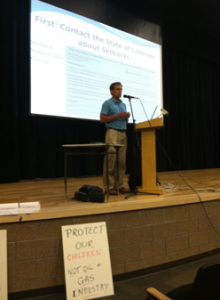
By Erin Adair, Colorado Program Coordinator
Clean Water Action, along with Sierra Club, Food and Water Watch and a local citizens group, What the Frack?! Arapahoe County co-sponsored a “Don’t FRACK Our Schools”, a public meeting last week in Aurora, CO We wanted to inform the community about newly leased lands to oil and gas companies and discuss what that means. You can see how close leased lands are to the K-12 community schools in the area here.
Neighborhoods in the front range of Colorado are being inundated with drilling and fracking. It’s alarmingly close to homes, residential parks, and schools. All Aurora has to do is look to other communities like Erie, Fredrick, and Winsor where drilling and fracking operations are quite literally in their backyards to see what’s happened. Aside from the obvious concerns - the carcinogens used in the fracking process, possibilities of groundwater contamination, diminished air quality, and scaring of the landscape - more serious quality of life issues arise when a well is being fracked in your backyard.
People in these communities are concerned about their property value dropping because of their proximity to an industrial process. They’re worried about the traffic created by hundreds of tanker trucks traversing local roads that haul water to drilling sites. And the intrusive light and noise pollution associated with the round the clock drilling operation that could last anywhere from 3 weeks to 6 months is a big problem for them.
Sonia Skakich-Scrima, an Aurora resident and activist for What the Frack?! Arapahoe County started the “Don’t FRACK Our Schools” event with a little background on the groups’ work. She was followed by Shane Davis, a Sierra Club member and volunteer, who discussed the dangers of drilling and fracking occurring in such close proximity to homes and schools. He shared stories from communities like Erie, Fredrick, and Winsor who have been forced to co-habitat with the oil and gas industry and outlined issues and concerns specific to drilling and fracking in Aurora.
Clean Water Action’s Program Director, Gary Wockner talked about how to turn the information from the event into action. There were two postcards attendees could sign. One was to the Colorado Oil and Gas Conservation Commission, telling the State’s regulatory agency to significantly increase the requirements of how far wells need to be from residential property or schools. There is currently a “Setback Stakeholder Group” to determine these regulations. The second postcard was to Congressman Mike Coffman who sits on the Natural Resources Committee and is on the Natural Gas Caucus. He has a voting record that is anti-environment and pro-Big Oil, the postcards outlined concern for Congressman Coffman’s support of fast-tracking oil and gas drilling on neighborhoods on the front range and on Western public lands and urged him to support federal regulations on fracking.
The information provided at the public meeting sparked many questions for the panelists and a led to many side conversations after the meeting was over. The “Don’t FRACK Our Schools” event got good coverage from the local CBS station on the 5pm news. The reporter went into the neighborhood around the school where the event was held and gave a voice to the concerns local residents have about the potential of drilling and fracking coming to their community.
The referenced media source is missing and needs to be re-embedded.
Gary Wockner on Taking Action on Fracking
Related Posts
Stay Informed
Get the latest updates and actions:
Thanks for signing up!
There was a problem processing your signup. Please try again.


